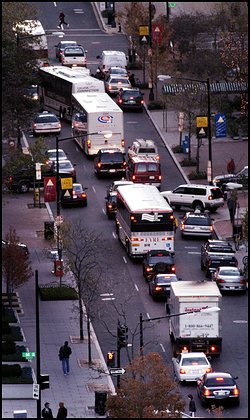Smart thinking on city parking
 Photographer: Gerald Martineau/The Washington Post. Traffic Congestion and double parking Caption: Evening rush hour traffic funnels to one lane traveling south on 19th St, NW because of illegal parking at curbside. From "Free Parking May End For D.C. Employees: Traffic Panel Offers Gridlock Solutions"
Photographer: Gerald Martineau/The Washington Post. Traffic Congestion and double parking Caption: Evening rush hour traffic funnels to one lane traveling south on 19th St, NW because of illegal parking at curbside. From "Free Parking May End For D.C. Employees: Traffic Panel Offers Gridlock Solutions"Mark Alan Hughes is a professor at Penn and he writes a weekly op-ed column in the Philadelphia Daily News. Today's column "TOUGH PARKING, TASTIER CENTER CITY " talks about how planning for parking must not take a path that diminishes the city's competitive advantage. From the column:
... I raise it now to discuss an important report on parking in Center City [Philadelphia].Whenever you get the feeling, "Who could argue with that?", it's time to look for the Hobson's choice. Reject the premise of the balanced strategy. Yes: residents, workers, and visitors need each other. That combination creates the cocktail we call the 24-hour downtown. But it does NOT follow that parking policies important to each group should be balanced.
Center City's only comparative advantage for residents, workers OR visitors is density. We have a grid of narrow streets and short blocks. We're more like Greenwich Village than midtown Manhattan. That's what brought and keeps anyone here, and that's the kind of residents, workers and visitors we should be luring. People looking to live, work or visit places with cheap and convenient parking don't really want to be in Center City anyway. Catering to them loses eventually because there will always be a place to live or work or visit that has better parking.
The choice is to preserve - or not - the qualities that are attracting thousands of new investors every year - a parking policy that includes making meters expensive enough to ensure available spaces on every block, raising the price of resident parking permits and limiting the number to existing spaces, requiring underground garages that don't disfigure the streets that now draw people from around the world and regulating sidewalks to serve as places to walk rather than as driveways.
That's a Center City in which parking is expensive but worth it.
____________________
It's the same for DC. No different at all.
I had almost the exact conversation with someone the other night--we were talking about the Giant Supermarket at the Tivoli, and the "fight" over getting Giant to yield its illegally seized driving lane inserted into the sidewalk-public space along Park Road. And I used almost the same language as Professor Hughes. I said something like "The comparative advantage that the city has is its pedestrian-centric urban design. Every time we discard this in favor of the car, we chip at and diminish the primary advantage that the city has."
Also see this blog entry from March, "The High Cost of Free Parking."



0 Comments:
Post a Comment
<< Home